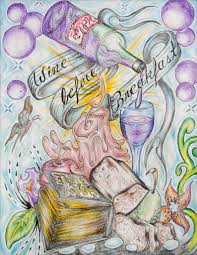[A review of Rachel Colman’s new album: Make A Way: music for liturgy & life]

“Answer me when I call, O God of my right!
You gave me room when I was in distress.
Be gracious to me, and hear my prayer.”
So begins Psalm 4.
The psalmist asks for an answer to their call,
and expects such an answer because the One
to whom the call is voiced is the “God of my right,”
the God of righteousness, of faithfulness.
And this passionate request is rooted in memory.
This isn’t the first time that the psalmist has been in need.
“You gave me room when I was in distress.”
You held space for me.
You allowed my anguish to be heard.
You did not require me to cover up my pain.
Having served most of my life in ministry
to young adults, I can attest that such “holding space,”
the giving of room for distress, for lament, for sorrow,
is at the very heart of a ministry of healing and hospitality.
And the struggle has always been
to find the words and the music for such space.
Indeed, the truth is that so much of Christian music,
and so much of our hymnody, actually denies such space-holding
in its manipulative joy and unwavering praise without reason.
 The Wine Before Breakfast community
The Wine Before Breakfast community
that I pastored at the University of Toronto
sought to be a place for such distress.
Founded in lament, one week after 9/11,
sorrow and anguish were never far from our worship.
The problem was that there were
so few resources
to help us give voice liturgically and musically
to the lament that was in our hearts over the years.
Enter Rachel Colman.
 A former member of the Wine Before Breakfast
A former member of the Wine Before Breakfast
music team,
Rachel now serves with her husband, Andrew,
in the community of st. benedict’s table in Winnipeg,
and she has now released an album of intense beauty,
Make A Way: music for liturgy and life.
Psalm 4 provides the template
for the opening and closing songs
that serve as the bookends
of this remarkable album.
The first track, “Do it Again” greets us with a haunting organ
and mournful, quiet wailing, before the first lines:
Lord are you listen’ to our crying?
God of comfort and mercy, hold our pain
When I was in trouble, you set me free
Do it again, Lord, do it again.
The passionate longing of this song
sets the tone for the rest of the album,
while laying the spiritual/theological foundations
for all that is to come.
There is, in this album,
neither cheap resolution to our lament,
nor a self-indulgent wallowing in our sorrow.
Rather, Colman leads us deeply into lament
with a disarmingly gentle honesty
and an always-tempered hope, rooted in memory.
Like the psalmists before her,
Colman deeply knows that
without memory, we are lost.
And so she evokes memories of healing
in the midst of naming the hurt,
while always refusing the cover up.
This is, perhaps, most richly portrayed
on the fourth track, “In our sorrow.”
Accompanied by Colman’s lovely and sensitive piano,
the artist sings:
When all our waiting comes to an end,
and turns to grieving;
when all these tears end in a way
that no way has been made clear;
when anguish has come to our home,
and filled our hearts,
You know, You know sorrow.
If that has been your experience,
if you know such waiting that only ends in grief,
if the tears have led to no resolution,
and you’ve experienced that all-encompassing anguish,
then not only do you know sorrow,
but so also does the Holy One.
If you know what it’s like
when all the waiting comes to an end,
and we’re left empty;
when good desire bears bitter fruit …
when all of our hoping
ends in the death of a dream …
and you have found yourself praying,
do You know, do You know our pain?
… then this album is for you,
as it moves between the space of confessing,
You know sorrow,
and achingly asking,
do You know our pain?
This album will catch your tears
even as it catches your breath.
It will give voice to your lament,
hold you in its beauty,
and gently, ever so gently,
make a way in and through the sorrow.
When all the waiting comes to an end,
and we’re still living;
though the darkness is strong,
and the night stretches long,
‘Remember,’ we say together,
‘remember: God walks with us
slowly in our sorrow … through our sorrow.
This is an album for such slow walking.
The title track, “Make a way,”
is a lovely congregational song
evoking the path of discipleship,
that reminds us that …
Though trouble and suffering
are all around,
our story does not end there.
With mercy and goodness
you welcome us,
forgiven at your table.
With this echo of the 23rd Psalm,
Colman sings of a hope
that is manifest at the table.
Rooted in the wisdom of the best
of Christian liturgical practice,
Colman directs us over and over again
to the table.
 A spirituality of lament is a Eucharistic spirituality
A spirituality of lament is a Eucharistic spirituality
because this is the table that bears witness to the cross;
this is the table of healing precisely because it is a table of suffering;
this is a table of hospitality for our deepest longings;
this is the table of distress that can hold our deepest hurts.
There is no escapism on this album.
And there are no distractions.
From song to song,
we are invited to attend to the pain,
and given permission to name and experience the sorrow in our bones,
while never seeking an easy way out, a quick fix.
The short chorus, “Do Not Tarry,”
has a clear allusion to Romans 8:
My body groans for your redemption.
My spirit waits for your day.
My heart longs for consolation.
On you we wait, for you we wait.
Do not tarry, Lord.
While not carrying the abrasiveness
of many of the psalms of lament,
this little song builds in an intensity
that is bold to ask God to hurry up
because there is a life and death seriousness to it all.
This is, if you will, a spirituality of insistence,
before the face of God
that will not insult the Holy One with empty praise
when so much is at stake.
The exquisite musicality of this album
carries this spirituality of insistence
with all of the intensity, tenderness,
longing, and hope that it evokes.
The album ends where it began, in Psalm 4.
And like Psalm 4, what begins in lament,
if allowed to plumb the depths of that sorrow,
if allowed the room for that distress,
ends in gratitude.
This is no easy resolution.
No “worship set” repetition of praise.
But resolution it is.
Referencing Psalm 4.7-8, the album concludes with “You’ve Given Me.”
You’ve given me greater joy than
those who drink well-aged wine.
You’ve given me greater joy than
those who feast all their days.
Perhaps still against much of the evidence,
restoration and delight are renewed.
And, not surprisingly,
Colman brings us back to the table.
You’ve given me of your self
the bread to eat for strength this day.
You’ve given me of your self
the wine that brings your joy always.
This is a Eucharistic restoration,
a safety found in community at the table.
Ever pointing us to that table,
Rachel Colman’s Make a Way
is an album of such powerful beauty and invitation
that is creates for the listener
that safety,
that restoration,
that joy and delight,
even as it breaks open our hearts,
touches our deepest longing,
and evokes our aching hope.
One Response to ““Make a way” … for sorrow and hope”
Jamie Howison
Thanks for this great introduction to Rachel’s album! I’ve heard many of the songs develop and unfold over the years, and now look forward to picking up my hard copy of the CD tomorrow evening at her album release concert here in Winnipeg. As the now-retired founding rector of saint benedict’s table, this sort of project gives me great joy!